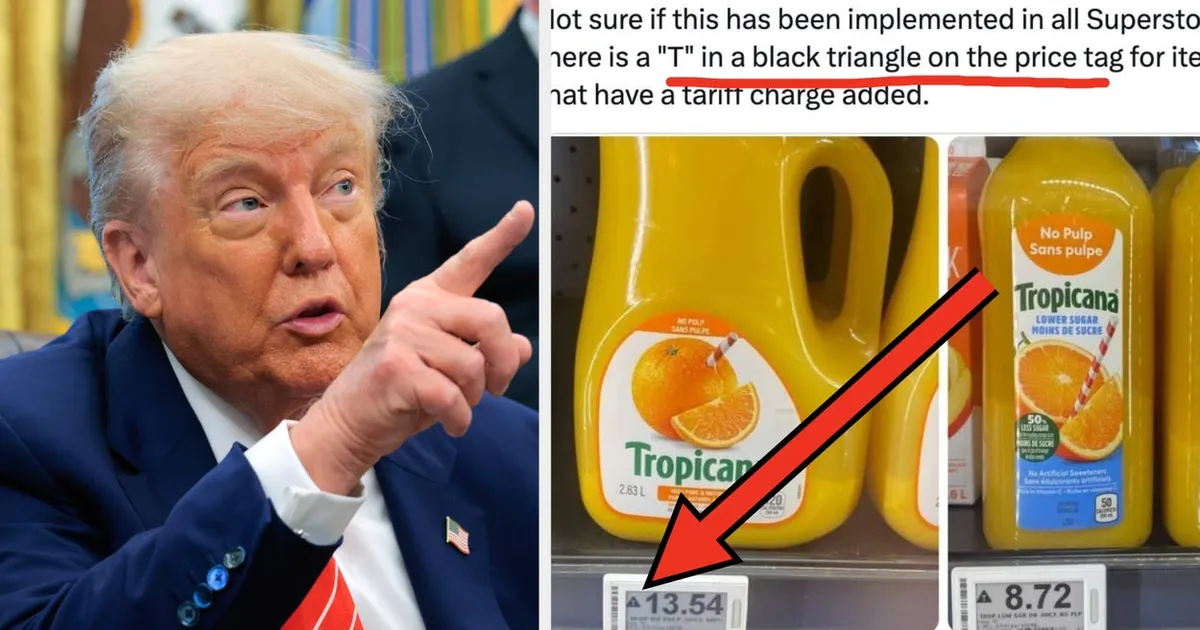
As Trump's tariffs come into effect, many Americans are beginning to feel the financial strain in their everyday lives and businesses. A recent example highlights the disparity between product costs and tariffs: a product priced at $524 is facing an astonishing tariff charge of $890. This significant markup is raising concerns among consumers and business owners alike.
One notable case comes from the company Wyze, which revealed an invoice showing a staggering duty charge of $255,000 on a shipment worth $167,000. This disclosure was aimed at those who might doubt the tangible effects of these tariffs. However, they are not alone in facing these challenges.
Another small business owner recently went viral on X (formerly Twitter) after sharing that they incurred a tariff charge of $2,885 on equipment that cost less than $2,000. Such examples illustrate the harsh realities that many face under the current tariff regime.
In a comparative analysis, a business owner demonstrated a stark difference in shipping costs between Canada and the US. This led to discussions about how tariffs are shaping consumer choices and business strategies. For instance, our neighbors to the north have started marking grocery items with a 'T' symbol to indicate the presence of tariff charges on imported products, reflecting growing consumer awareness.
Many small businesses are grappling with the increasing costs associated with tariffs. For instance, some brands are quietly incorporating tariff costs into their shipping fees, making it difficult for consumers to recognize the true impact of these charges. In a more drastic measure, certain companies, such as a lingerie brand, have even paused shipments to the US due to the overwhelming tariff burdens.
Even the purchase of used items is not immune to tariff fees. One Reddit user recounted their experience of buying a pre-owned Louis Vuitton wallet from Japan, only to discover an unexpected tariff charge of $83.10 from DHL on top of their initial payment.
Tariffs are also affecting more personal facets of life, such as celebrating special occasions. A user shared that they encountered tariff charges on flowers just in time for Mother's Day, highlighting how these fees are creeping into even the simplest purchases.
Healthcare is another area feeling the squeeze. Many essential supplies and equipment used by healthcare providers are imported, leading to increased costs for services. As more individuals share their experiences with these tariffs, it's clear that the repercussions are widespread.
In the BuzzFeed Community, individuals voiced their frustrations over rising costs due to tariffs. One user noted that after getting engaged, numerous bridal retailers have announced price increases on wedding-related items, making an already expensive process even more burdensome.
Another commenter shared the impact of tariffs on employment. They reported that their daughter’s workplace in Sweden laid off 25 employees, citing reduced orders attributed to US tariffs and the ongoing conflict in Ukraine.
Small business owners are particularly vulnerable to these changes. One seller revealed they had to stop carrying certain items due to increased costs, which rose from $3.49 to $10.49 each. This dramatic price hike has forced them to rethink their business strategy entirely.
Another small business owner expressed their concern, stating that the tariffs have made it nearly impossible to compete, resulting in a loss of profits and an uncertain future. This sentiment is echoed by many who rely on imported materials for their products.
The implications of tariffs extend beyond individual experiences; they affect entire industries. For example, one school IT professional noted that after June 1, the prices of Chromebooks would either soar or stop being imported altogether, leaving many schools in a lurch.
One retail worker shared that their store is already seeing increased prices due to tariffs on grills and tools, emphasizing the growing discontent among customers as they face higher costs.
As supply chain issues continue to surface, one worker reported production delays due to the lack of available green tea extract from China, a situation that is likely to impact consumers soon.
The cumulative effect of these tariff-related increases is evident across various sectors. From home repair quotes rising by 20% to significant reductions in shipping volumes at ports, the situation raises critical questions about the future of trade and economics in America. As individuals and businesses alike navigate these challenges, it’s vital to share experiences and strategies for coping with the financial burden of tariffs.
Have you noticed any tariff-related price increases affecting your life or business? We invite you to share your thoughts in the comments below.